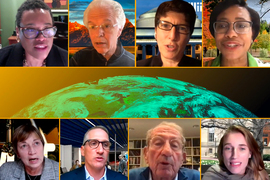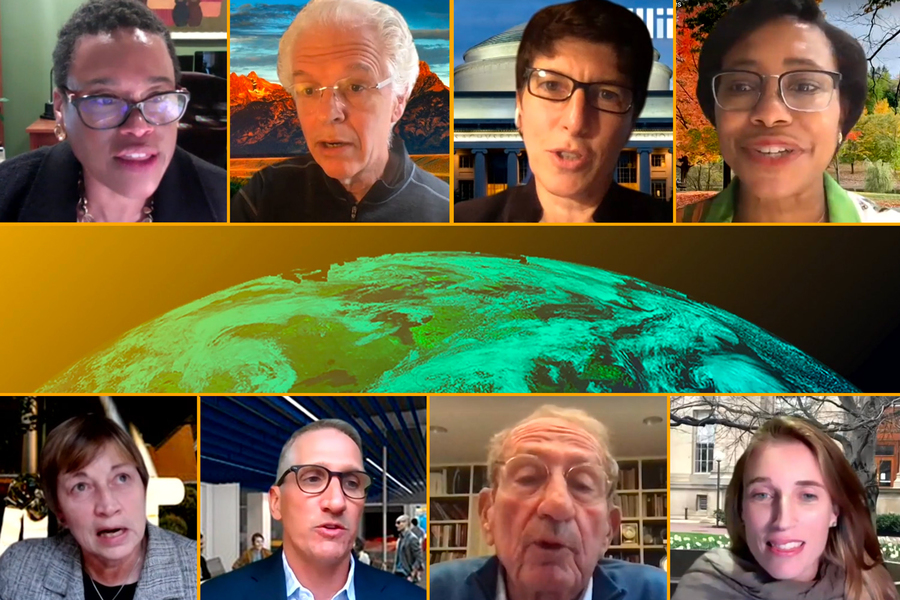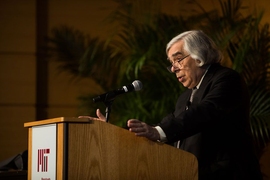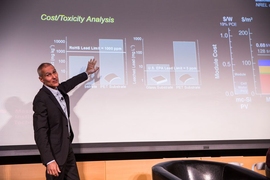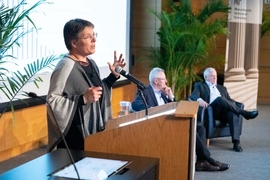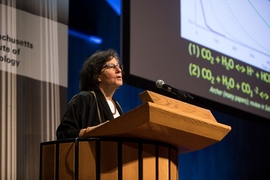Under its Plan for Action on Climate Change, MIT has a goal of reducing its greenhouse gas emissions by at least 32 percent below its 2014 emission levels, by 2030. Those reductions are now at 24 percent, and the Institute is on track to meet or exceed the goal, said Joe Higgins, vice president for campus services and stewardship, thanks to Institute-wide efforts that benefit from connecting research and operations.
In the fifth of six symposia in the Climate Action series, held Oct. 20, an online panel of MIT experts including Higgins discussed the role of research universities in tackling climate change. Research universities like MIT provide critical technology and policy innovations, the speakers said, but can also act as role models for other institutions.
“Higher education has a responsibility, an opportunity to set their sights on being an exemplar organization and community in how to face, respond to, and address the climate change issue,” said Professor Paula Hammond, head of the Department of Chemical Engineering and a co-chair of the symposium.
The 170 acres of the MIT campus and its affiliate programs are a kind of living laboratory and testbed for climate solutions, “to demonstrate the technology and the choices that we as people make to move the campus forward,” said Krystyn Van Vliet, associate provost and professor of materials science and engineering and of biological engineering.
In one effort to connect research and operations, Higgins and his colleagues asked participants at the 2018 MIT Energy Hack to find ways of using machine learning to reduce emissions in large buildings. The MIT Sustainability DataPool, a portal of campus sustainability data open to the MIT community, is another way the Institute encourages its researchers “to use the campus as a testbed to generate game-changing solutions” to climate challenges, said Julie Newman, director of sustainability and lecturer in the Department of Urban Studies and Planning.
Having this model in place was a tremendous help when the Covid-19 pandemic created a new influx of personal protective equipment (PPE) and single-use plastic items to manage within the campus’ consumption and waste sustainability plan, said Newman, also a symposium co-chair. “When all of a sudden the challenge of Covid comes and we notice that we’re going to have to grapple with supply chain and use and disposal of PPE, it didn’t take but a couple of weeks to reach out and pull together a research team, an operations team, a finance team, and say let’s study this in MIT style.”
Research universities must be a source of innovations to address global climate change, said Associate Provost Richard Lester, “because our existing government-led innovation system is falling short, even relative to the inadequate benchmarks set by governments themselves.”
Among the efforts to encourage these innovations is MIT Climate Grand Challenges, a program launched in July 2020 that encourages all MIT researchers to develop and implement climate mitigation and adaptation solutions. The program already has received more than 100 letters of interest from more than 300 faculty and senior researchers, Lester said.
Technological breakthroughs are still needed urgently to stop the buildup of greenhouse gases in the atmosphere, despite the talk among some experts that the technological solutions are already available, said Maria Zuber, MIT vice president for research and the E.A. Griswold Professor of Geophysics.
“I wish these individuals who think we have the technology were right. But they’re not. We do not currently have the technology we need to rapidly and adequately make the needed energy transition,” Zuber said. “This is why our work at MIT matters so much.”
Climate solutions must include more than just advanced science and technology capabilities, said Melissa Nobles, the Kenan Sahin Dean of the School of Humanities, Arts, and Social Sciences, and professor of political science. At MIT, she notes, classes on the ethics of climate change, the J-PAL King Climate Action Initiative, and Charlotte Brathwaite’s “Bee Boy” theater project are some examples of how the social sciences and arts can be brought to bear on climate issues.
“As I see it, the more that research institutions can invent practical ways for these various forms of knowledge to intersect, blend, and become mutually informing, the more quickly we can generate effective climate solutions,” Nobles said.
At the same time, universities should remember that climate change policy is only one of several issues, including global health, poverty, and racism, “which deserve and command our attention,” said Institute Professor Emeritus John Deutch. He also sounded a note of caution about how universities should engage in policy discussions. “They cannot speak out with one voice, or should do so very rarely,” he said, because members of the university community often hold diverse opinions and points of view.
The final symposium in the series, “What is the World Waiting For? Policies to Fight Climate Change” will take place online Nov. 16.
